The global gasoline gensets market is projected to grow from USD 11.3 billion in 2025 to approximately USD 17.5 billion by 2035, recording an absolute increase of USD 6.2 billion over the forecast period. This translates into a total growth of 55.3%, with the market forecast to expand at a compound annual growth rate (CAGR) of 4.5% between 2025 and 2035. The overall market size is expected to grow by nearly 1.55X during the same period, supported by increasing frequency of power outages, rising demand for portable power solutions, and growing construction and outdoor activities requiring reliable backup power generation.
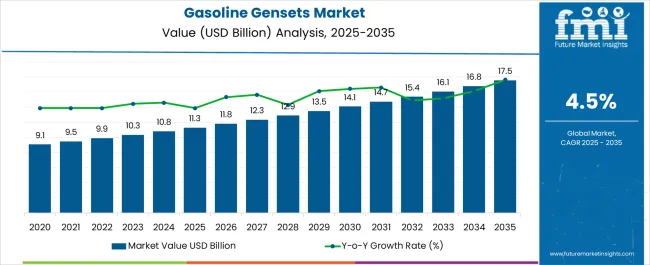
Between 2025 and 2030, the gasoline gensets market is projected to expand from USD 11.3 billion to USD 14.0 billion, resulting in a value increase of USD 2.7 billion, which represents 43.5% of the total forecast growth for the decade. This phase of development will be shaped by the rising frequency of extreme weather events causing power disruptions, increasing adoption of portable power solutions for recreational activities, and growing demand for backup power in residential and small commercial applications. Generator manufacturers are expanding their gasoline genset product portfolios to address the growing demand for reliable and portable power generation solutions.
| Metric | Value |
|---|---|
| Estimated Value in (2025E) | USD 11.3 billion |
| Forecast Value in (2035F) | USD 17.5 billion |
| Forecast CAGR (2025 to 2035) | 4.5% |
From 2030 to 2035, the market is forecast to grow from USD 14.0 billion to USD 17.5 billion, adding another USD 3.5 billion, which constitutes 56.5% of the overall ten-year expansion. This period is expected to be characterized by the expansion of smart generator technologies, the integration of fuel injection systems for improved efficiency, and the development of environmentally-friendly engine technologies. The growing adoption of hybrid power solutions and increasing demand for quiet operation generators will drive innovation in gasoline genset design and performance characteristics.
Between 2020 and 2025, the gasoline gensets market experienced steady expansion, driven by increasing awareness about power backup solutions and growing frequency of power outages due to aging electrical infrastructure and extreme weather events. The market developed as consumers and businesses recognized the importance of reliable backup power for maintaining operations and comfort during power disruptions. Construction industry growth and outdoor recreational activities began emphasizing the necessity of portable power generation solutions for remote and temporary applications.
Market expansion is being supported by the increasing frequency of power outages and the corresponding demand for reliable backup power solutions that can provide immediate electricity during grid failures. Modern consumers and businesses are increasingly focused on maintaining power continuity for essential appliances, electronic devices, and critical operations during electrical disruptions. Gasoline gensets' proven ability to deliver reliable power with portability and ease of use makes them preferred solutions for residential, commercial, and construction applications requiring temporary or emergency power generation.
The growing emphasis on outdoor recreational activities and construction projects is driving demand for gasoline gensets that can provide portable power in remote locations without access to electrical grid infrastructure. Consumer preference for generators that combine reliability with portability and user-friendly operation is creating opportunities for innovative gasoline genset designs. The rising influence of extreme weather events and climate-related power disruptions is also contributing to increased adoption of backup power solutions across residential and commercial sectors.
The market is segmented by power rating, phase, end use, and region. By power rating, the market is divided into ≤ 2 kW, > 2 kW - 5 kW, > 5 kW - 8 kW, and > 8 kW - 15 kW. Based on the phase, the market is categorized into three stages and a single phase. In terms of end use, the market is segmented into residential, commercial, and construction. Regionally, the market is divided into North America, Europe, East Asia, South Asia & Pacific, Latin America, and the Middle East & Africa.
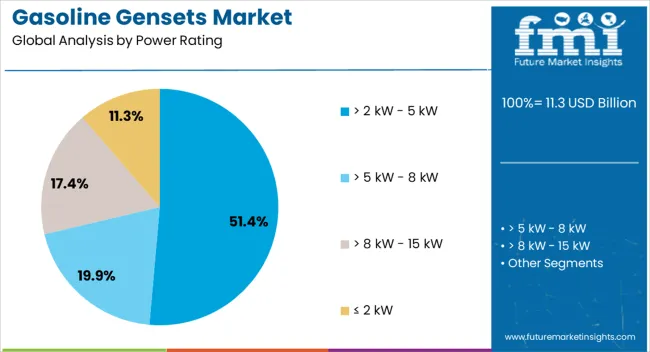
The > 2 kW - 5 kW power rating segment is projected to account for 51.4% of the gasoline gensets market in 2025, reaffirming its position as the most popular power range category. Consumers and businesses increasingly prefer this power range for its optimal balance of power output and portability, providing sufficient electricity for essential appliances and equipment while remaining manageable for transportation and storage. This power range's ability to support multiple household appliances or small commercial equipment directly addresses most backup power requirements while maintaining cost-effectiveness and operational simplicity.
This power rating forms the foundation of most residential and small commercial backup power strategies, as it represents the most practical solution for essential power needs during outages without excessive fuel consumption or operational complexity. Manufacturer investments in engine efficiency and generator design optimization continue to strengthen adoption in this segment. With consumers prioritizing reliable backup power that balances capability with affordability, > 2 kW - 5 kW gensets align with both performance requirements and budget considerations, making them the central component of portable power solutions.
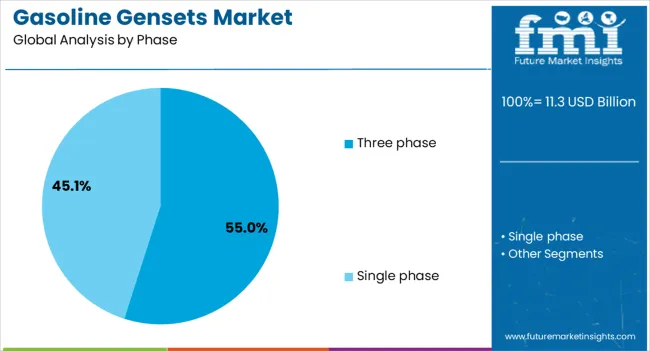
Three-phase gasoline gensets are projected to represent 55% of market demand in 2025, underscoring their critical role in commercial and industrial backup power applications. Businesses and construction operations prefer three-phase gensets for their ability to power commercial equipment, industrial tools, and multiple electrical systems simultaneously with better load distribution and motor efficiency. Positioned as essential power solutions for commercial applications, three-phase gensets offer both operational efficiency benefits and compatibility with commercial electrical systems.
The segment is supported by growing commercial construction activity and increasing adoption of gasoline gensets in small to medium commercial establishments requiring reliable backup power. Additionally, three-phase systems provide better power quality and reduced vibration for sensitive equipment applications. As commercial users prioritize operational continuity and equipment protection, three-phase gasoline gensets will continue to dominate the market while supporting comprehensive commercial power backup strategies.
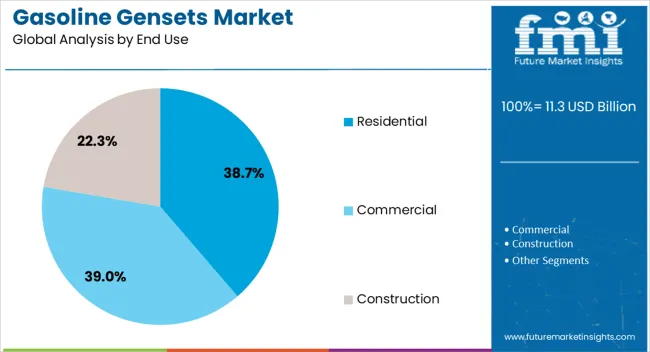
The residential end-use segment is forecasted to contribute 38.7% of the gasoline gensets market in 2025, reflecting the growing importance of home backup power solutions for family comfort and safety during power outages. Homeowners increasingly invest in gasoline gensets to maintain essential services, including lighting, refrigeration, heating/cooling, and electronic communications during electrical disruptions. This aligns with residential trends that emphasize home preparedness and continuity of comfort during infrastructure failures.
The segment benefits from increasing frequency of weather-related power outages and growing consumer awareness of the benefits of backup power for home security and comfort. With rising dependence on electronic devices and home automation systems, residential gasoline gensets serve as essential infrastructure for maintaining modern lifestyle standards during power disruptions, making them a critical component of home emergency preparedness and comfort assurance strategies.
The gasoline gensets market is advancing steadily due to the increasing frequency of power outages and the growing demand for portable power solutions across residential and commercial applications. However, the market faces challenges, including environmental concerns about emissions, noise pollution issues, and competition from alternative power sources, including battery systems and solar generators. Innovation in engine efficiency and emission control technologies continues to influence product development and market expansion patterns.
The growing construction industry and increasing popularity of outdoor recreational activities are enabling expanded applications for portable gasoline gensets in remote locations and temporary power requirements. Construction sites require reliable power for tools and equipment in areas without electrical infrastructure, while outdoor enthusiasts demand portable power for camping, RVs, and outdoor events. These applications are driving demand for rugged, portable gensets with reliable performance characteristics.
Modern gasoline genset manufacturers are incorporating smart monitoring systems, automatic start capabilities, and fuel injection technologies to improve operational efficiency and user convenience. These technologies enhance fuel economy while providing better engine protection and maintenance scheduling capabilities. Advanced engine designs also enable reduced emissions and noise levels while maintaining power output and reliability for various applications.
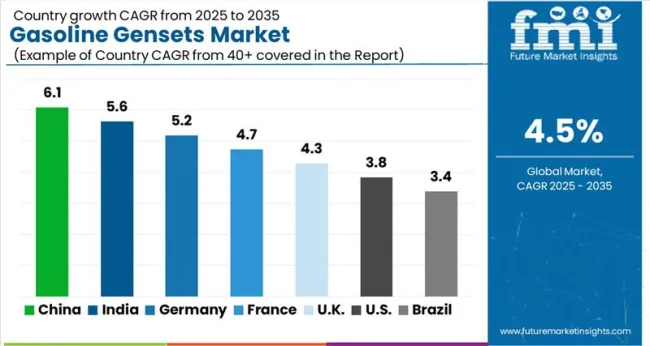
| Country | CAGR (2025 to 2035) |
|---|---|
| China | 6.1% |
| India | 5.6% |
| Germany | 5.2% |
| France | 4.7% |
| UK | 4.3% |
| USA | 3.8% |
| Brazil | 3.4% |
The gasoline gensets market is experiencing solid growth globally, with China leading at a 6.1% CAGR through 2035, driven by rapid construction activity, expanding manufacturing sector, and increasing demand for portable power solutions in industrial and residential applications. India follows closely at 5.6%, supported by infrastructure development, the growing construction industry, and rising awareness about the importance of backup power. Germany shows strong growth at 5.2%, emphasizing quality engineering and commercial applications. France records 4.7%, focusing on construction and recreational applications. The UK shows 4.3% growth, prioritizing residential backup power and emergency preparedness.
The report covers an in-depth analysis of 40+ countries; top-performing countries are highlighted below.
Revenue from gasoline gensets in China is projected to exhibit strong growth with a CAGR of 6.1% through 2035, driven by massive construction activity and expanding industrial development requiring portable power solutions. The country's growing manufacturing sector and increasing frequency of power infrastructure challenges are creating significant demand for reliable backup power generation. Major domestic and international generator manufacturers are establishing comprehensive production and distribution capabilities to serve the expanding industrial and construction markets.
Revenue from gasoline gensets in India is expanding at a CAGR of 5.6%, supported by the rapidly growing construction industry, expanding infrastructure development, and increasing awareness about backup power solutions for residential and commercial applications. The country's developing electrical infrastructure and frequent power disruptions are driving demand for reliable gasoline generator solutions. International generator manufacturers and domestic companies are establishing comprehensive distribution networks to address the growing demand for portable power equipment.
Demand for gasoline gensets in Germany is projected to grow at a CAGR of 5.2%, supported by the country's advanced construction industry and strong emphasis on reliable power equipment for commercial and industrial applications. German businesses and construction companies consistently demand high-quality gasoline gensets that meet stringent performance requirements and provide dependable power generation for critical operations.
Revenue from gasoline gensets in France is projected to grow at a CAGR of 4.7% through 2035, driven by the country's active construction sector and strong outdoor recreation culture that requires portable power solutions. French construction companies and recreational users consistently demand reliable gasoline gensets that deliver consistent performance in diverse operating conditions and applications.
Revenue from gasoline gensets in the UK is projected to grow at a CAGR of 4.3% through 2035, supported by a strong emphasis on emergency preparedness and residential backup power solutions. British consumers and businesses value power reliability, equipment quality, and proven performance, positioning gasoline gensets as essential components of comprehensive emergency preparedness and power continuity strategies.
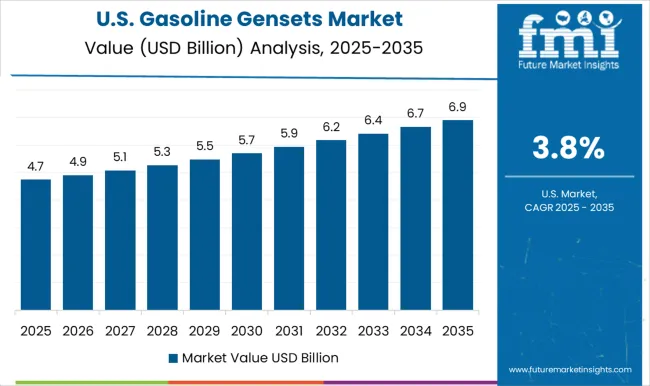
Revenue from gasoline gensets in the USA is projected to grow at a CAGR of 3.8% through 2035, supported by the country's mature backup power market, established construction industry, and preference for reliable portable power solutions. American consumers and businesses prioritize equipment reliability, brand reputation, and technological advancement, making quality gasoline gensets a preferred choice in residential, commercial, and construction applications.
Revenue from gasoline gensets in Brazil is projected to grow at a CAGR of 3.4% through 2035, supported by expanding construction activity, raising awareness about backup power benefits, and increasing adoption of portable power solutions for residential and commercial applications. The country's developing infrastructure and occasional power reliability challenges are creating opportunities for gasoline genset market growth. International equipment manufacturers and domestic distributors are establishing comprehensive service networks to serve the growing demand for reliable power generation equipment.
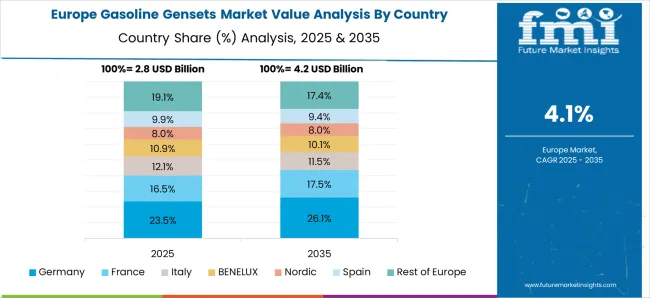
The gasoline gensets market in Europe demonstrates mature development across major economies, with Germany showing a strong presence through its industrial applications and emphasis on reliable backup power solutions, supported by users leveraging engineering expertise to implement high-quality gasoline gensets that emphasize durability and performance for commercial and construction applications requiring portable power generation. France represents a significant market driven by its construction sector and outdoor recreation culture, with companies and consumers focusing on versatile gasoline genset solutions that combine French engineering with reliable power generation for construction sites, residential backup power, and recreational activities in diverse environmental conditions.
The UK exhibits considerable growth through its emphasis on emergency preparedness and backup power solutions, with strong adoption of gasoline gensets in residential properties, small businesses, and construction applications. Germany and France show expanding interest in low-emission genset applications, particularly in environmentally sensitive areas and noise-restricted zones. BENELUX countries contribute through their focus on quality power equipment and construction industry requirements. Eastern Europe and Nordic regions display growing potential driven by infrastructure development and expanding adoption of portable power solutions across diverse applications.
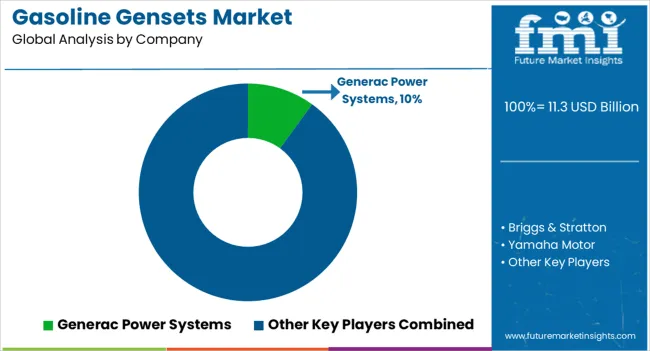
The gasoline gensets market is characterized by competition among established power equipment manufacturers, specialized generator companies, and emerging portable power solution providers. Companies are investing in engine technology advancement, product design innovation, distribution network expansion, and customer service capabilities to deliver reliable, efficient, and user-friendly gasoline generator solutions. Brand reputation, product quality, and after-sales support are central to strengthening market position and customer loyalty.
Generac Power Systems leads the market with significant market share, offering comprehensive gasoline genset solutions with a focus on residential and commercial backup power applications and advanced generator technologies. Briggs & Stratton provides reliable engine and generator technologies with emphasis on durability and performance. Yamaha Motor Co., Ltd. delivers high-quality portable generators with a focus on quiet operation and fuel efficiency. Champion Power Equipment focuses on value-oriented generator solutions with emphasis on accessibility and reliability.
Honda India Power Products Pvt. Ltd. provides premium portable generators with emphasis on quality engineering and fuel efficiency. Atlas Copco AB offers industrial-grade portable power solutions with a focus on construction and commercial applications. Cummins Inc. delivers comprehensive generator solutions, including gasoline-powered options. Deere & Company provides agricultural and construction-focused power equipment. DEWALT, DuroMax Power Equipment, and FIRMAN Power Equipment offer specialized portable generators for various consumer and commercial applications with a focus on performance, durability, and value positioning.
| Items | Values |
|---|---|
| Quantitative Units (2025) | USD 11.3 billion |
| Power Rating | ≤ 2 kW, > 2 kW - 5 kW, > 5 kW - 8 kW, > 8 kW - 15 kW |
| Phase | Three-phase, Single-phase |
| End Use | Residential, Commercial, Construction |
| Regions Covered | North America, Europe, East Asia, South Asia & Pacific, Latin America, Middle East & Africa |
| Countries Covered | United States, Canada, United Kingdom, Germany, France, China, Japan, South Korea, India, Brazil, Australia and 40+ countries |
| Key Companies Profiled | Generac Power Systems, Briggs & Stratton, Yamaha Motor Co., Ltd., Champion Power Equipment, Honda India Power Products Pvt. Ltd., Atlas Copco AB, Cummins Inc., Deere & Company, DEWALT, DuroMax Power Equipment, and FIRMAN Power Equipment |
| Additional Attributes | Dollar sales by power rating and end use category, regional demand trends, competitive landscape, buyer preferences for three-phase versus single-phase systems, integration with smart technologies, innovations in engine efficiency, emission control advancement, and portable power solution development |
The global gasoline gensets is estimated to be valued at USD 11.3 billion in 2025.
The market size for the gasoline gensets is projected to reach USD 17.5 billion by 2035.
The gasoline gensets is expected to grow at a 4.5% CAGR between 2025 and 2035.
The key product types in gasoline gensets are > 2 kW - 5 kW, > 5 kW - 8 kW, > 8 kW - 15 kW and ≤ 2 kW.
In terms of by phase, three phase segment to command 55.0% share in the gasoline gensets in 2025.






Full Research Suite comprises of:
Market outlook & trends analysis
Interviews & case studies
Strategic recommendations
Vendor profiles & capabilities analysis
5-year forecasts
8 regions and 60+ country-level data splits
Market segment data splits
12 months of continuous data updates
DELIVERED AS:
PDF EXCEL ONLINE
Single Phase Gasoline Gensets Market Size and Share Forecast Outlook 2025 to 2035
Gasoline Direct Injection Market Growth - Trends & Forecast 2025 to 2035
Gasoline Turbochargers Market Insights – Growth & Forecast 2025 to 2035
Gasoline Generator Market - Growth & Demand 2025 to 2035
E Gasoline Market Size and Share Forecast Outlook 2025 to 2035
Asia Pacific Gasoline Injection Technologies Market Size and Share Forecast Outlook 2025 to 2035
Pygas (Pyrolysis Gasoline) Market
LNG Marine Gensets Market Size and Share Forecast Outlook 2025 to 2035
Home Standby Gensets Market Size and Share Forecast Outlook 2025 to 2035
Hybrid Marine Gensets Market Size and Share Forecast Outlook 2025 to 2035
Commercial Gas Gensets Market Size and Share Forecast Outlook 2025 to 2035
Onboard Marine Gensets Market Size and Share Forecast Outlook 2025 to 2035
Commercial Diesel Gensets Market Size and Share Forecast Outlook 2025 to 2035
Air Cooled Home Standby Gensets Market Size and Share Forecast Outlook 2025 to 2035
Standby Commercial Diesel Gensets Market Size and Share Forecast Outlook 2025 to 2035
Single Phase Home Standby Gensets Market Size and Share Forecast Outlook 2025 to 2035
Liquid Cooled Home Standby Gensets Market Size and Share Forecast Outlook 2025 to 2035
Gas Liquid Cooled Home Standby Gensets Market Size and Share Forecast Outlook 2025 to 2035
Single Phase Portable Conventional Gensets Market Size and Share Forecast Outlook 2025 to 2035
Air Cooled Three Phase Home Standby Gensets Market Size and Share Forecast Outlook 2025 to 2035

Thank you!
You will receive an email from our Business Development Manager. Please be sure to check your SPAM/JUNK folder too.
Chat With
MaRIA